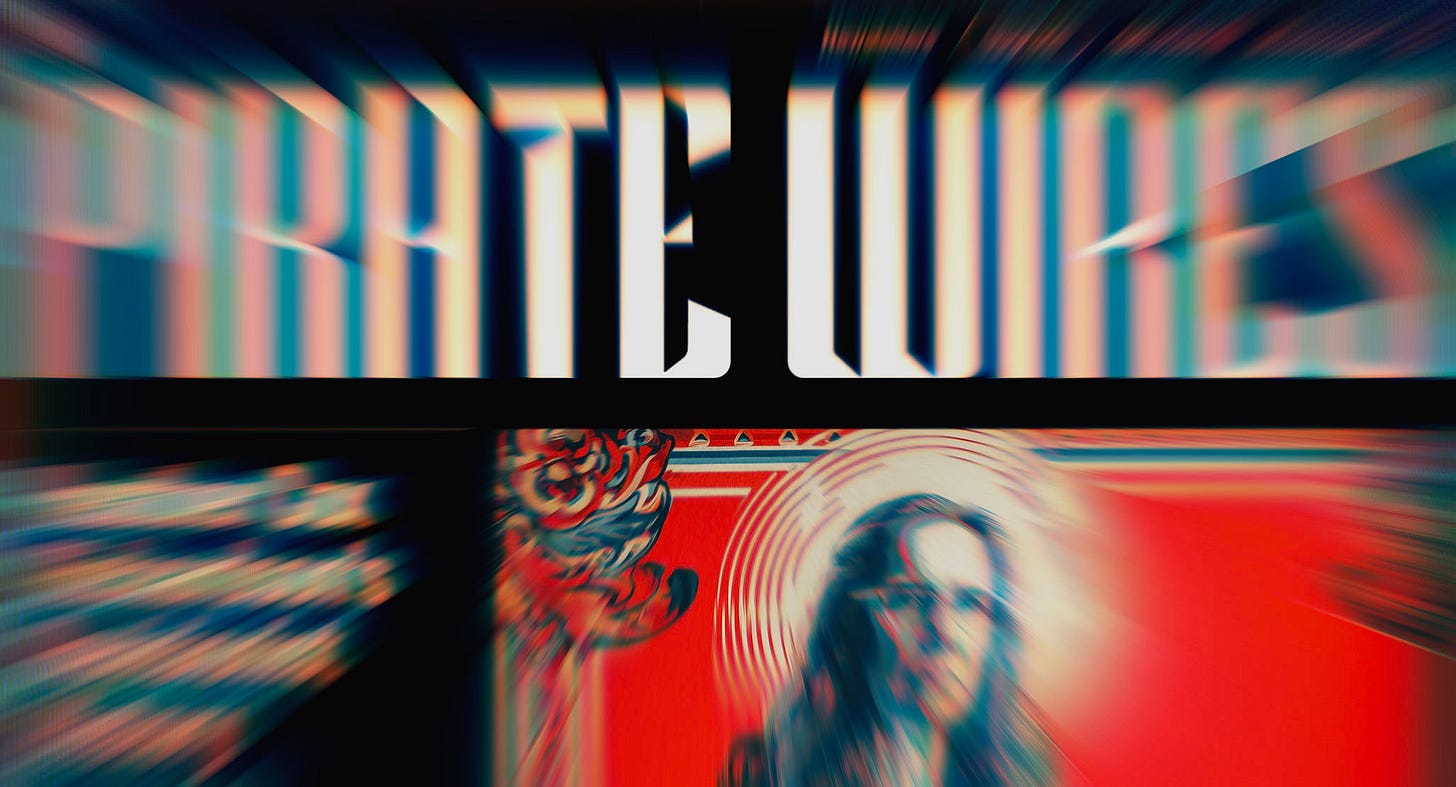The PirateWires Method
A case study in how sophisticated cowards attack truth-tellers while serving power
Let’s be direct about what Mike Solana is: a cynic who’s convinced himself he’s the hero. Not some puppet taking orders from Peter Thiel—he genuinely believes he’s the brave iconoclast challenging liberal pieties. But believing you’re independent doesn’t make it so, especially when every editorial choice you make perfectly aligns with your patron’s political interests. Whether or not Thiel personally directs editorial content is irrelevant—the alignment is unmistakable. Nothing I’ve written—or believe—suggests any coordination by direct instruction; the critique concerns alignment of incentives and outcomes. He’s figured out that attacking the right targets and framing things the right way keeps him VP at Founders Fund while playing at journalism.
Whether he admits this to himself is irrelevant. The work speaks for itself.
This isn’t about personality or gossip—it’s about structure: how power incentivizes certain stories and punishes others.
The pattern is simple once you see it. And the Richardson affair exposes it perfectly.
Act I: The Hit Piece
Blake Dodge and Katherine Dee publish 5,000 words in PirateWires attacking historian Heather Cox Richardson. They obsess over whether she initially got Tyler Robinson’s party registration correct. They catalogue her rhetorical choices. They tut-tut about her “narrativizing.”
But here’s what they never do: ask whether her core thesis is right. Whether Trump exhibits authoritarian patterns. Whether warrantless mass detentions violate the Fourth Amendment. Whether Stephen Miller calling judicial review “insurrection” represents fascist rejection of constitutional governance.
Instead, they give us this gem: “Presumably, Trump could have reasons for doing what he’s doing.”
Presumably.
There’s the tell. Solana’s writers demand Richardson provide ironclad evidence for recognizing authoritarian patterns while insisting readers should presume Trump’s benevolent motives. The burden of proof gets inverted completely—those warning about tyranny must prove every detail beyond doubt, while the tyrant gets presumed virtue until proven otherwise.
This is sophistry in service of power. Nothing more, nothing less.
Act II: The False Innocence
When I point out what the piece actually does—provide cover for authoritarianism by attacking those who recognize it—Katherine Dee clutches her pearls. She’s just committed to accuracy! She’s just making sure the opposition’s arguments are solid!
How touching.
A passionate commitment to meticulous fact-checking that manifests exclusively as attacks on those challenging authoritarian power, published in a vehicle run by a Thiel lieutenant who believes he’s defending truth while somehow only ever attacking its defenders.
When I ask the obvious question—how did this piece come about? Did Solana commission an attack on Richardson, or did his writers spontaneously decide the real threat to democracy is a historian who sometimes gets details wrong?—Dee accuses me of “guilt by association.”
As if asking about editorial process at a publication run by a venture capital executive, funded by a billionaire who explicitly rejects democracy, is somehow illegitimate conspiracy theorizing rather than basic journalistic due diligence.
Act III: The Mask Drops
Solana, to his credit, at least has the decency to abandon the pretense: “yes because I don’t respect you.”
No defense of the piece’s methodology. No explanation of editorial process. No argument that “presumably Trump has reasons” represents sound analytical framework.
Just naked contempt as substitute for engagement.
This is the aristocratic epistemology made explicit. Some people—people Solana respects, people in his network, people useful to the same patron—their arguments deserve consideration. Everyone else? Dismissible. The contempt itself becomes the refutation.
At least he’s honest about his dishonesty. Which is more than can be said for his writers, still performing wounded innocence while laundering apologetics for authoritarian power.
The Believer’s Utility
Let’s not mince words about what PirateWires does. Solana genuinely believes he’s doing brave independent journalism, challenging liberal orthodoxy, speaking truth to progressive power. That he’s wrong about this—that he’s providing intellectual cover for oligarchic power consolidation—doesn’t make the pattern less clear.
Thiel writes that democracy and freedom are incompatible. He funds Curtis Yarvin’s neo-monarchist fantasies. He bankrolled Vance, who advocates going extra-constitutional. And Solana produces exactly the kind of sophisticated criticism that makes democratic alarm seem hysterical while never quite defending what’s actually happening.
This is how sophisticated propaganda works when the propagandist believes he’s doing something else entirely. You attack those recognizing authoritarianism as insufficiently careful, too partisan, too quick to assume malevolence. You demand they prove every detail beyond doubt while extending infinite charitable presumption to power. When Richardson helps her 2.7 million subscribers recognize authoritarian patterns, PirateWires attacks her—not by defending Trump’s actions, but by obsessing over her imperfections while treating his presumed benevolence as proper baseline.
It’s that simple.
And when challenged, you either perform innocence (”I’m just committed to accuracy!”) or assert contempt (”I don’t respect you”). Either way, you never defend the substance. Never explain why warrantless mass detentions deserve presumed benevolence. Never address whether calling judicial review “insurrection” represents authoritarian rejection of constitutional governance.
If Solana actually believed Trump’s actions deserve defense, he could defend them. But defending authoritarianism explicitly would contradict his self-conception as brave truth-teller. So his publication attacks those who recognize it, wraps the attack in concerns about “accuracy,” and he collapses into contempt when pressed—serve power while believing you’re challenging it, provide sophisticated cover while convinced you’re exposing hypocrisy.
The Question They Won’t Answer
How did the Richardson piece come about? Did Dodge and Dee pitch it to Solana? Or did Solana suggest that maybe someone should take a close look at that historian who’s helping millions recognize authoritarian patterns?
This isn’t complicated. It’s basic editorial transparency. Who conceived this piece? Who shaped its framing? What role did institutional priorities play in target selection?
A simple, factual answer—”They pitched it” or “I assigned it”—would end the matter. The refusal to say which reveals the stakes.
They won’t answer.
Dee calls it “guilt by association.” Solana asserts contempt. But refusing to answer is itself an answer. They know what honest disclosure would reveal: that PirateWires isn’t independent journalism but coordinated influence operation, that Solana isn’t brave editor but useful instrument who believes his own propaganda, that the Richardson piece isn’t rigorous critique but strategic attack shaped by institutional context everyone pretends doesn’t matter.
Katherine Dee wants evaluation on her work, not Solana’s? Fine. Her work treats “presumably Trump has reasons” as neutral methodology rather than normative claim serving power. Her work obsesses over Richardson’s errors while never asking whether her pattern recognition is accurate. Her work serves to delegitimize effective democratic voices while refusing to defend the authoritarian patterns they recognize.
And when asked basic questions about how this work came to exist, she hides behind “guilt by association” while her editor—who believes he’s serving truth—asserts naked contempt.
That’s not journalism. That’s sophisticated cowardice in service of oligarchic power, performed by people who genuinely believe they’re doing something else entirely.
Richardson has 2.7 million subscribers learning to recognize authoritarian patterns through historical expertise. PirateWires published 5,000 words to undermine that recognition without defending what they’re providing cover for. Solana runs the publication. Thiel funds Solana. Thiel backs politicians who reject constitutional constraints. Thiel writes that democracy fails.
Solana doesn’t need a memo from Thiel telling him to attack Richardson. He believes he’s serving truth by challenging what he sees as liberal hysteria. That this belief produces exactly the kind of content that serves oligarchic power consolidation—that’s what happens when someone who thinks he’s the iconoclast has perfectly internalized the incentive structure that keeps him employed.
When asked whether this is journalism or coordinated attack, they respond with performance and contempt. Because answering honestly would require admitting they’re doing exactly what they claim isn’t happening: laundering authoritarian apologetics through the appearance of rigorous critique, attacking effective democratic voices in perfect alignment with those building infrastructure for hierarchy’s restoration.
They know it.
That this somehow always manifests as attacking those who threaten oligarchic interests while extending infinite charity to oligarchic power—well, that couldn’t possibly mean anything, could it?
Service Confused for Rebellion
So yes, Mike—I don’t respect you either. But unlike your contempt, mine was arguably earned through observation of what you actually do: run interference for powerful interests while believing you’re challenging entrenched authority, attack effective democratic voices while convinced you’re serving truth, provide cover for authoritarian consolidation while certain you’re exposing liberal hysteria.
Your writers launder apologetics through false balance while believing they’re serving accuracy. Your publication exists to delegitimize those who threaten oligarchic power while convinced it’s challenging establishment control. And you’ve built such a perfect self-conception that you don’t even need to recognize what you’re actually doing.
When caught, you assert contempt as substitute for argument—because engagement would require looking clearly at the pattern: who you attack, who you defend, whose interests you serve regardless of what you believe you’re serving.
Now answer the question you keep dodging: who commissioned the Richardson hit piece, and what role did your institutional context play in shaping it?
The silence isn’t just deafening. It’s revealing. Because answering would require recognizing what you actually are—not the brave iconoclast challenging authority, but the useful instrument providing sophisticated cover for oligarchic power consolidation while believing you’re doing something else entirely.
He mistakes service to hierarchy for rebellion against it. The vulgar pathos is that power knows it—and that’s why it keeps him around.
Go Deeper into the Circus





The funny thing is the conceit of "speaking truth" here. Anyone who cares about truth and has witnessed Trump's constant parade of lies can't credibly presume anything good of him. Nor is there any way to reconcile Trump's lies. He's even inconsistent with himself.
“If Solana actually believed Trump’s actions deserve defense, he could defend them.” Bingo.
It is that simple.
HCR chronicles what is a daily spewing fountain of facts and places those facts into historical context. A great many of those facts are reprehensible, inexplicable and indefensible. One can not parse a mountain of sewage without what may appear to be an occasional whiff of disdain in the telling.
Get over it — or wade in and defend that moldering pile — Mr. Vance can give you some pointers.